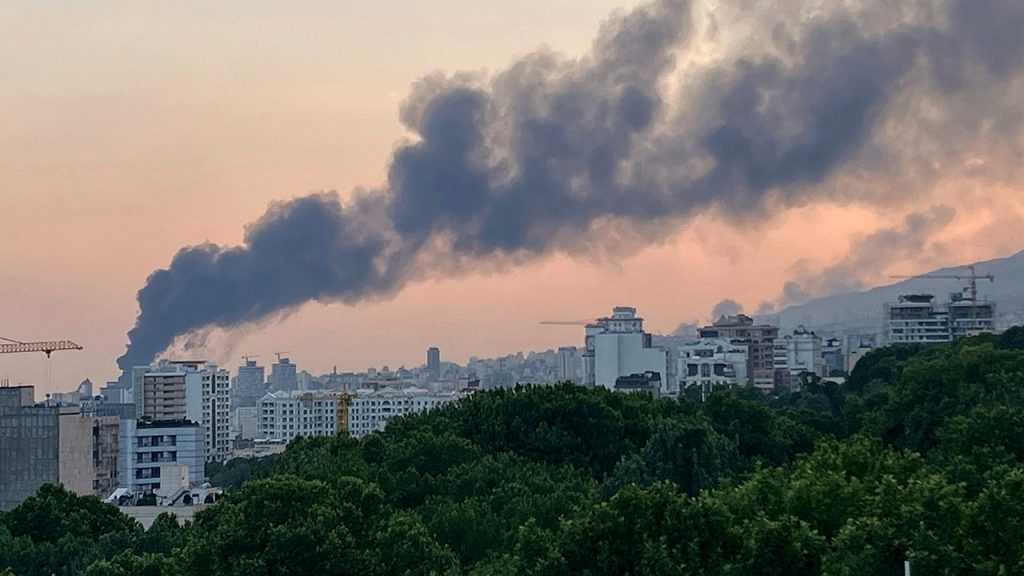The U.S. Virtual Embassy in Iran has issued a warning urging Americans to vacate the country amid ongoing regional conflicts and following a recent partial reopening of the nation’s airspace. The advisory comes in the wake of a ceasefire agreement between Iran and Israel aimed at resolving nearly two weeks of hostilities. With travel conditions still uncertain, U.S. citizens are advised to take immediate action to ensure their safety and facilitate their departure.
| Article Subheadings |
|---|
| 1) Overview of Current Conditions in Iran |
| 2) Advisory from the U.S. Embassy |
| 3) Recommended Actions for American Citizens |
| 4) Potential Risks for U.S. Citizens |
| 5) Conclusion and Future Implications |
Overview of Current Conditions in Iran
Tensions in Iran have surged as the country confronts both internal challenges and external threats. Following a ceasefire agreement that seeks to halt recent military actions between Israel and Iran, the region remains fraught with instability. The atmosphere is particularly tense, with both military and political uncertainties contributing to a volatile security landscape.
As of June 26, 2025, Iran’s airspace has been partially reopened, allowing for limited air travel amid the ongoing conflict. However, access to various regions has become a major concern for travelers, especially those with U.S. citizenship. The geopolitical dynamics in the area continue to shift, creating an unpredictable environment for foreign nationals, including Americans who may find themselves in precarious situations.
Advisory from the U.S. Embassy
In light of these tensions, the U.S. Virtual Embassy in Iran has emphasized the importance of American citizens vacating the country. The advisory underscores that safe passage may require ground travel to neighboring countries, including Azerbaijan, Armenia, Turkey, and Turkmenistan. Those wishing to depart are strictly advised to follow local news and coordinate with commercial airlines for flight availability.
The U.S. State Department has also introduced a crisis information form to assist American citizens in accessing consular services. Despite these efforts, the embassy warns that due to constraints on U.S. diplomatic presence in Iran, direct assistance may be limited. This serves as a crucial reminder of the difficult conditions U.S. citizens may face in the region.
Recommended Actions for American Citizens
The embassy has laid out a series of recommendations for those remaining in Iran. First and foremost, affected individuals are urged to create a plan that does not rely on U.S. government assistance, as the unpredictable nature of the situation may impede prompt government help. This includes ensuring that mobile devices are charged and maintaining communication with family and friends to keep them informed of one’s situation.
Additionally, it is vital for American citizens in Iran to prepare for emergencies. This includes packing essential items such as food, water, and medicine, while also having a safe location within their city to retreat to if necessary. Moreover, those who have dual citizenship are advised to travel on Iranian passports to circumvent potential legal complications with Iranian authorities, who may view U.S. citizenship unfavorably.
Potential Risks for U.S. Citizens
It is critical for U.S. citizens to understand the heightened risks they face while in Iran. Interrogations, arrests, and detentions are all significant concerns, especially for individuals who hold dual citizenship. The Iranian government does not officially recognize dual nationality, complicating the legal landscape even further. A U.S. passport, or any evidence of U.S. citizenship, can act as a trigger for scrutiny from Iranian authorities.
Advisories reveal that Americans remaining in Iran should exercise extreme caution; lacking a proper exit strategy could lead them to be stranded in potentially dangerous circumstances. The embassy continues to emphasize the importance of developing alternative communication plans, as Iranian authorities have occasionally restricted internet access and phone lines, further complicating travel and communication.
Conclusion and Future Implications
The warning issued by the U.S. Virtual Embassy is emblematic of the complex geopolitical realities of the region. With ongoing hostilities between Iran and Israel, coupled with general instability within the area, Americans are strongly encouraged to evaluate their safety and mobility options critically. Those who choose to remain must weigh the risks and take proactive measures to mitigate potential dangers.
The implications of these advisory measures extend beyond immediate safety concerns; they may also raise discussions regarding the role of the U.S. government in protecting its citizens abroad amidst escalating global tensions. As this situation continues to evolve, monitoring by officials and the media will remain paramount as they seek to inform and protect American interests.
| No. | Key Points |
|---|---|
| 1 | U.S. Virtual Embassy urges Americans to leave Iran amid regional conflicts. |
| 2 | Access to Iran’s airspace has been partially reopened but remains unpredictable. |
| 3 | U.S. citizens advised to travel to neighboring countries by land, if safe. |
| 4 | Potential risks of interrogations and detentions exist for U.S. citizens. |
| 5 | Emergency plans and alternative communication methods are strongly recommended. |
Summary
As tensions continue to escalate in the region, the advisory from the U.S. Virtual Embassy serves to highlight the complexities faced by American citizens in Iran. The importance of quick and effective action cannot be overstated, as the situation remains fluid and potentially dangerous. Citizens are encouraged to prioritize their safety and prepare adequately for any eventuality while the diplomatic landscape remains unpredictable.
Frequently Asked Questions
Question: Why is the U.S. encouraging citizens to leave Iran?
The U.S. is urging citizens to leave Iran due to ongoing regional conflicts and the potential risks associated with remaining in the country during tense conditions.
Question: What should American citizens do if they cannot leave Iran?
Those unable to leave should find a secure location, prepare an emergency kit with food and supplies, and keep communication lines open with loved ones.
Question: What should dual citizens consider when leaving Iran?
Dual citizens must use their Iranian passport to exit the country and should be prepared to face scrutiny from Iranian authorities.


